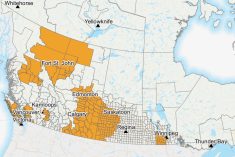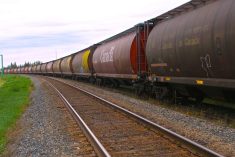The federal government is leaving its deferred cash purchase ticket policy unchanged.
When listed grains (wheat, oats, barley, rye, flax, canola, rapeseed) are delivered for payment at a licensed elevator, an elevator operator can issue either a cash purchase ticket or a deferred cash purchase ticket, payable in the year following the year in which the grain is delivered.
Under current tax law, a farmer who opts for a deferred cash purchase ticket is then able to include the amount of the ticket in taxable income in that following year.
Read Also

JBS profit falls amid still-challenging US market environment
JBS, the world’s largest meat company, reported a net profit fall in the third quarter in spite of a rise in global net sales amid a still-challenging beef market environment in the U.S., according to an earnings statement on Thursday.
The tax treatment of deferred cash purchase tickets “is a departure from the general rule with respect to taxpayers (including other farmers),” the government said after unexpectedly announcing in the March 2017 budget that the measure was under review.
The talk of eliminating the option alarmed many in the grain industry, including KAP members who debated the policy a month later at an advisory council meeting April 20.
“It’s not avoiding taxes (by being able to defer grain sale payments into the next tax year),” said Foxwarren farmer George Graham at the time, who moved the resolution. “It’s just a way to balance out taxes.”
“We all know how tough marketing is and… if you’re going to start timing grain sales because of when you need the income, it’s just going to cause problems,” Starbuck farmer Reg Dyck said while debating the resolution.
Others in the grain industry added their voices to the chorus calling for retaining the system.
Deferred cash purchase tickets help farmers and grain companies, Western Grain Elevator Association executive director Wade Sobkowich, said April 11 on the sidelines of the Canadian Global Crops Symposium in Calgary.
“We’ll be required to pay farmers (who can’t defer payment) sooner than we do today, all things being equal, and therefore the cost of financing will go up (for grain buyers),” Sobkowich said.
“Farmers who defer delivery until the next tax year means we are altering delivery patterns and we may not be taking advantage of peak price periods. Grain companies will have less control as to when they call the grain forward and that can impact their ability to extract revenue from the marketplace. So it can complicate delivery patterns and it can increase the cost of financing to grain companies and all of those costs get shared by the industry.”
Given ups and downs in grain production and grain prices, farmers need tools to even out their income, he added.
The government quietly made the announcement yesterday as part of a larger announcement titled “Additional Tax Support for Canadian Farmers.”
In that document the government also committed to “providing tax relief” for livestock producers who received compensation for having to destroy their herds in the 2016-2017 bovine tuberculosis outbreak in Saskatchewan and Alberta.
Livestock producers in areas where farmers qualified for a livestock tax deferral to rebuild their herds following flood or drought will now also be able to defer a portion of their 2017 proceeds from the sale of breeding stock into 2018.














